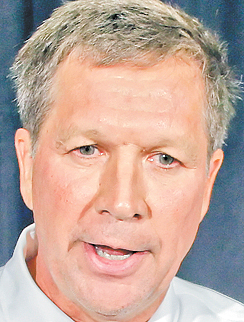Kasich touts JobsOhio role


Kasich
By Marc Kovac
Second of a four-part series
COLUMBUS
State lawmakers have not yet given JobsOhio the authority to administer the job-creating programs currently housed in the Ohio Department of Development.
But Gov. John Kasich and the new private nonprofit’s interim president chief development officer Mark Kvamme are already touting the role the group is playing in economic development.
Documents released to the media during a recent year-end interview with Kasich noted JobsOhio’s involvement in 246 business projects that created or retained 82,785 jobs with a payroll of nearly $4.8 billion and $3.2 billion in new capital investment.
And the group and state officials are hopeful that more jobs and investment will come in the new year, thanks to the emerging horizontal hydraulic fracturing, or fracking, industry.
“We don’t want to underregulate at all, but we don’t want to overregulate,” Kasich said of the state’s role in controlling fracking. “We don’t want under-do impact fees, but we don’t want to overdo it. It’s like porridge, not too hot, not too cold, just right. And if we can do that and manage it and give them certainty, I think we’ll be OK.”
On JobsOhio’s Progress
“We have been a part of creating 21,000 new jobs,” said Kvamme, a longtime Kasich friend who served as the governor’s top jobs adviser before becoming head of JobsOhio. “It’s fantastic for 21,000 families, but it’s close to a billion dollars of new payroll. That billion dollars is going to be spent at the nail salon, at the pizza parlor, at the dry cleaners. It’s going to be spent at all these places that really employ a ton of people. You’re going to start seeing that acceleration throughout the entire state. ...
“We’re now on the map. The governor and I ... and several others traveled down to Houston to see what was going on in job creation down there for the shale [and hydraulic fracturing industry], where we literally had 20 guys in a room. The governor asked, ‘What are you going to do in Ohio?’ We went around the room. It was thousands and thousands of jobs. ... There’s a lot of opportunity outside the state. We are now going on the offensive.”
On Fracking Issues
“We will have tough and clear regulations,” Kasich said. “It will be things that will affect things like gathering lines, high-pressure pipe lines, knowing the kind of chemicals that we are using in these operations. It’s from A to Z. And let me also be clear that the biggest companies want strong regulation. We don’t want yahoos coming into Ohio and damaging the environment. We are working on that everyday. We study North Dakota, Wyoming. ... We study the economists when they run a bad article. We want to be on top of everything, because this, if it pans out, if it works out the way that it looks like it will, it could bring an economic resurgence really to all of Ohio, not just the eastern part of Ohio. So we are working on that. We’re working on the severance taxes, we’re working on the impact fees.
“We need an impact fee so we can send help to the local governments as we have an issue with infrastructure erosion. We don’t want the local governments taxing this stuff, because the companies, I’ll tell you what they’ll do. Tax them, overregulate them, they’re leaving. They’re not coming here. It’s just the way it works. An impact fee they understand. Make it too high, and it will damage our prospects. ... We will be good partners with local governments to help them manage their challenges.
“Secondly, severance tax, too low. ... We tax the gas, we tax the oil but we don’t tax the liquid. So there’s going to be a need to do something with the severance tax so we can all benefit from that, and it’s something that will benefit the state but not designed to overtax, because you overtax, they’re not coming. We’re going to make our money in Ohio by having jobs and people with jobs paying taxes because they’re working.
“There’s going to need to be regulations affecting things like groundwater, the containment facilities, what you do with gathering lines, what you do with these high pressure pipe lines we would expect to see in the state. ... Work force training is going to be a big deal, because we’re going to want our people working there.”
 43
43
